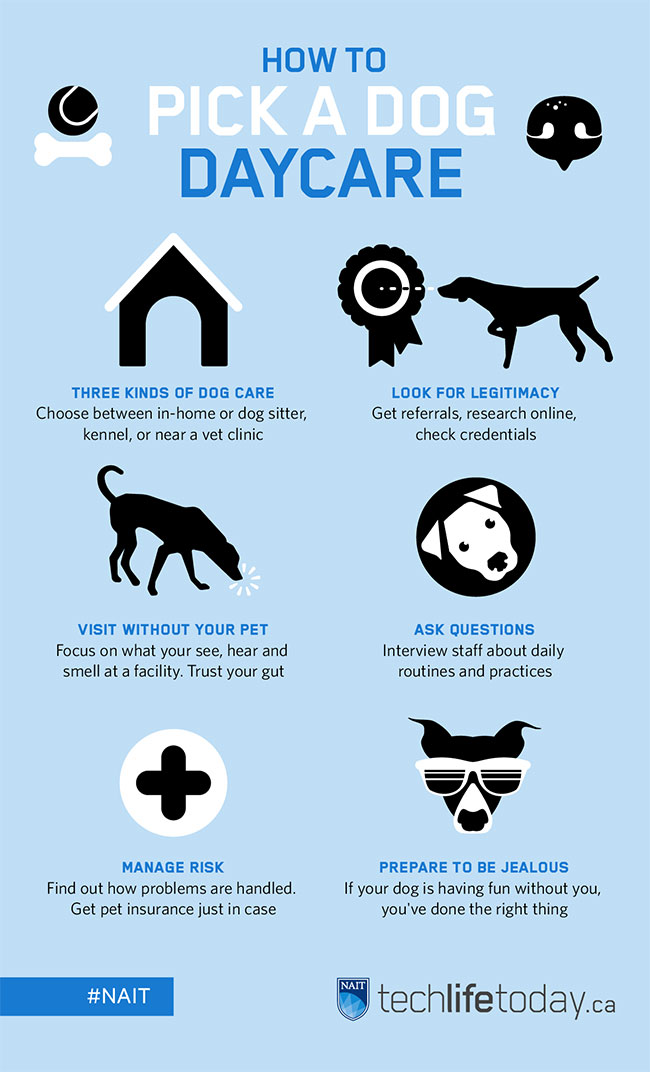Simplify your search for Fido's home away from home
Many pet owners will recognize the scenario: you've left the dog alone a little too long and come home to find, say, toilet paper streaming out of the bathroom or the odd houseplant replanted – on the living room floor. But there is a solution: doggie daycare.
It's not only canine boredom or separation anxiety that might make you want to send Fido on a field trip. Animals with health issues and puppies who can't yet hold it from nine to five may also benefit.
Daycare for dogs has gained in popularity as our relationship with pets has changed, explains Nichole Boutilier, chair of NAIT's Veterinary Medical Assistant program. "Our pets are more members of our family than ever before. We're much more concerned with their quality of life," says Boutilier, whose own brood includes two Labrador retrievers, two cats, Rhode Island red chickens and Irish draft horses.
Here are her tips on how to find the right daycare for those times when Fido shouldn't be alone.
Three kinds of dog care
Broadly speaking, there are three kinds of care: in-home or at your dog sitter's, boarding at a kennel, or through your veterinary care team. "Do you want a day-long playing opportunity or a structured routine to help housetrain a puppy?" asks Boutilier. A dog with medical issues might benefit from being near a vet clinic.
Look for legitimacy
Pet daycares aren't certified beyond a standard business licence, so referrals and careful vetting (pun intended) are key.
Ask people at the dog park where they send their pets. Also ask vet clinics, humane societies, kennels and reputable breeders for referrals, says Boutilier. If you search Google or Yelp for boarding facilities, or sites such as rover.com for local care, be sure to check reviews. (Daycares and kennels associated with a veterinary clinic are regulated as part of the Veterinary Profession Act in Alberta.)
Boutilier looks for legitimacy. "Maybe they have a working relationship with a veterinarian or are attached to a vet's office. Perhaps they are engaged with the pet community through a dog grooming facility."
She recommends looking for caregivers with credentials, such as people who have completed vet technician training and may work part-time as carers and sitters.
Visit without your pet
"Visit a place the first time without your pet, so you can focus on what you see, what you hear and what you smell," says Boutilier.
For instance, does the place smell clean? How are staff interacting with the dogs they are caring for? And, very importantly, how do they screen the other dogs that yours might end up coming nose to nose with?
Ask a lot of questions
Interview potential caregivers about their approach and staff training. Are animals walked alone or in a group, and on or off leash? Are they given time to rest? Also, how many dogs does the carer have at any given time and how do they group them? Boutilier notes that reliable carers will consider size, temperament and age when pairing animals. An arthritic senior dog, for example, is not likely to enjoy playing with a boisterous puppy.
"Accidents happen because personalities of dogs sometimes clash, so get a handle on how the staff might react," she says. Find out what warning signs they're trained to look for and at what point they separate dogs.
Ask how medical and safety issues are delt with, and be sure to communicate your expectations. Some may be skilled at administering diabetes or thyroid medication, for example.
How to manage risks
"Even a well-run, well-managed facility will have some incidents," says Boutilier. "It's a when not an if."
Ultimately, pet owners are responsible for their animal, and may want to have pet insurance. A comprehensive insurance policy for your pup, which is charged monthly, covers medical costs for illnesses, injuries and accidents. It may also cover advertising for a lost pet. Just as with house and life insurance, policies vary widely so research coverage, exclusions, limitations and other terms.
Ask carers how they handle medical emergencies – will they take your pup to the vet if they are ill? You can also provide emergency contacts and details about your veterinarian.
Before your pup's first day, make sure their vaccines are up to date. Many caregivers won't accept animals otherwise. Boutilier recommends having your dog vaccinated for Bordetella, also known as "canine cough."
Prepare to feel a little envy
If you've found the right spot and sent your pup off for the day, be prepared for a little envy. While you're stuck at work or school, your dog is hopefully chasing squirrels, playing with newfound buddies or snoozing between walks. Boutilier has even heard of some dogs whose caregivers bake them biscuits or share the Sunday roast.
If you're feeling sad about all the fun Fido is having without you, you've likely made the right choice – and made sure that your four-legged family member is safe, happy and healthy even when you're not around.
 This article appears in the spring 2018 issue of techlife magazine.
This article appears in the spring 2018 issue of techlife magazine.